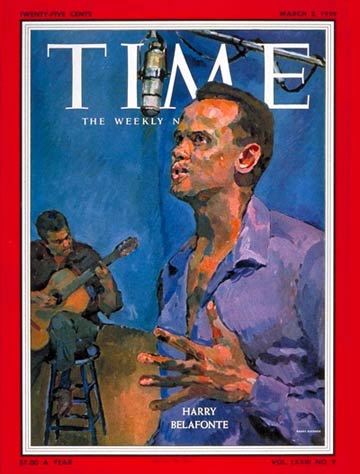
Harry Belafonte
(7 of 8)
Dinner at Home. In the wake of success, the pressures mounted. Belafonte's first psychoanalyst was a woman whose husband happened to be a writer and sometime talent agent. Says Belafonte: ''Her husband took me over." While the doctor attempted an emotional analysis. the agent applied economic therapy. Before long, Harry broke with both the analyst and the agent. Then his marriage fell apart. "I didn't know the fireside and meals every night at 6," says Harry, but Marguerite knew little else. She now has custody of their two children, Adrienne, 9, and Shari, 4, although they spend their summers with their father. Belafonte's second wife is Julie Robinson, the 3O-year-old daughter of Russian-Jewish parents, once the only white member of the Katherine Dunham company. She and Harry have a 16-month-old son, David.
Considering his income (about $750,000 a year), the Belafontes live in relative austerity. Until last fall they lived in a three-room walkup in a converted brownstone. ("Harry is the only millionaire in America," said a friend at the time, "who goes down to the cellar to empty his own garbage.") Since then they have moved into a more luxurious, ten-room apartment on Manhattan's West End Avenue (there was a splash of newspaper publicity when the landlords on the fashionable East Side refused to rent to a Negro family). Belafonte has collected contemporary paintings and Haitian sculptures, in the vocabulary of his trade cares little for clothes (twelve suits, eight sports jackets, three tuxedos), owns no real estate. He drinks little (he has no head for liquor), neither diets nor exercises regularly to keep in his famed trim, although he concedes that "nothing would destroy the illusion faster than a belly." When he is in Manhattan he rarely misses a dinner at home, and he usually gets eight hours' sleep a night. He likes to sing for his children.
Belafonte now moves in what he calls an "interracial world," mostly composed of people from show business. He hopes that his son will grow up in the same world. "He will have to have some of the experiences I had as a Negro or that his mother had as a Jew," he says. "I don't necessarily want to save him from it." Harry devotes some time to Negro affairs (the N.A.A.C.P., the Wiltwyck School for Boys, the Rev. Martin Luther King's Montgomery Improvement Association), gives 20% of his income to his partly tax-exempt Belafonte Foundation of Music and Arts, designed to "get young people with talent out from under the hammer."
Keep Moving. Harry Belafonte has been out from under the hammer for a long time, but he pushes on with some of the same fierce drive of the kid in the subway, the hash slinger in the window, the misplaced pop crooner in the jazz dives. His capacity for working over a performance or a recording is legendary. When things are going right, he has been known to record all night, until, as Songwriter Lord Burgess says, "you expect his liver to come up with the next note."
